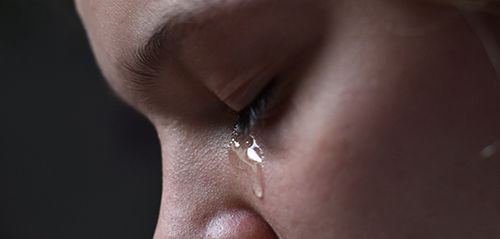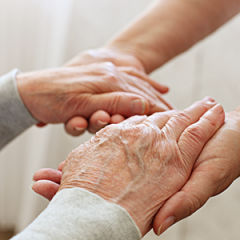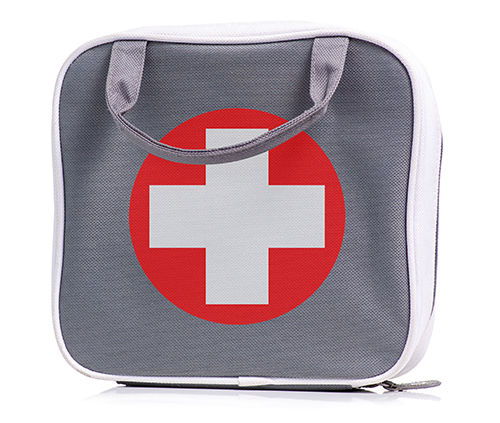
Grieving is a normal and natural response to a major loss. When people hear the word grief, they immediately think of losing someone close to them, a partner, relative or friend. However, grief reactions can also be triggered by:

The death of a person whose life experience you can identify with (common interests, similar aspirations, same culture, same age, student at the same school, etc.).

The loss of professional, physical, or social activities, cognitive functions, a pet or an important object.

A death or any significant loss can affect people to varying degrees, in a way that is personal and unique to each individual. A lot depends on the meaning and importance given to the person, situation or object.

For most people, grief occurs in three major stages, in a variable and unpredictable order (Canadian Mental Health Association). However, each bereavement is unique, and each person grieves in their own way.
Here are the three stages of grief and the possible reactions:

During this stage of shock, you gradually "digest" this new reality and regain your resources in order to manage the loss situation.

A feeling of numbness or "being in a fog" when faced with the news; a feeling of being on "automatic pilot.”

Denial of facts and reality, detachment from emotions, unusual hyperactivity or lethargy, difficulty realizing what is happening: "it can't be happening!”

After the shock wears off, various emotions and symptoms can surface and impact your daily functioning. Here are a few of them:

● Feeling of emptiness, discouragement, sadness, despair
● Crying
● Increased anger (irritability, detachment, dwelling on loss)
● Decrease or loss of interest in activities that you usually enjoy
● Guilt and remorse

● Fatigue and sleep disorders
● Loss of appetite and weight loss
● Anxiety
● Headaches
● Muscle or chest pain
● Digestive problems

● Social isolation; emotional or psychological withdrawal
● Agitation and nervousness
● Feeling weighted down or slow
● Increased substance use (e.g., alcohol, drugs, medication)

● Marked difficulty making decisions and concentrating on work or studies
● Tendency to excessively focus on or throw yourself into work/studies

At this stage, although the pain persists, feelings of sadness or discouragement start to fade, and you may find yourself reliving happy memories of events and special times shared with the deceased person. This stage is characterized by signs such as:

● Gradual acceptance of reality
● Progressive return to "normal" life, in a different context: studies, work, social life
● Increased energy level and interest in activities that were important to you before the loss: search for solutions and ways to move beyond the pain
● Quest for meaning: soul-searching to explore your values, beliefs and spirituality

Although some reactions may sometimes surprise you or seem uncontrollable, this is normal. There is no right or wrong way to grieve. However, adopting healthy ways of dealing with pain can help you emerge from the tragedy.

Contact well-meaning, attentive people: AVOID ISOLATION.

Accept the support of people in your social circle.

Share your emotions with your loved ones.

Be patient and kind to yourself: give yourself all the time you need.

Allow yourself to be sad, angry or to express all your feelings, whatever they may be.

Take care of your physical health: maintain good eating, sleeping and exercise habits.

Practice meaningful, revitalizing activities that improve your well-being.

Make yourself useful in your own way, to your family or community: for example, by offering help to a neighbour or an elderly aunt.

Show kindness to others and take action to support those around you.

Carry out the customary funeral rituals: religious, spiritual or other ceremonies.

Give away the deceased's clothing and personal belongings; keep a few souvenirs to remember the lost loved one by.

Create a photo album illustrating some significant moments.

Keep a personal diary where you record your thoughts, dreams, and anything else you think is important under the circumstances.

Express (in writing, music, dance, drawing, etc.) insights that you gained during your introspection and periods of reflection.

Preserve a "living legacy" of the deceased based on that person’s qualities and talents that you appreciated, and try to incorporate them into your life.

Most often, the impact of grief gradually decreases as time passes, especially past the one-year anniversary of the loss (which includes special occasions such as holidays and birthdays). However, if the state of grieving persists and continues to affect your daily functioning significantly, professional resources are there to help.

Please email Student Services any time at sae.soutien@hec.ca. A counsellor will contact you to provide support.

If you feel you need psychological support, do not hesitate to contact your HEC Montréal Employee Assistance Program.

Web page that lists organizations specializing in grief and their contact information

Help line: 1-866-APPELLE
(1-866-277-3553)
Resources for people who lost someone due to suicide

Help line (in French):
1-888-LE DEUIL (1-888-533-3845)
Web page with detailed information on grief and support resources (in French):

Help line (in French):
1-855-889-3666
Individual and family resource website for both adults and children in mourning.

5255, avenue Decelles, suite 5.120
Montréal (Québec) H3T 2B1
514 340-6166
The page was built with Mobirise